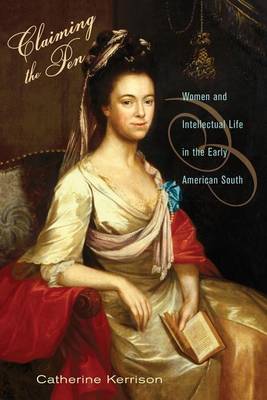10%OFF

Stock image for illustration purposes only - book cover, edition or condition may vary.
Claiming the Pen: Women and Intellectual Life in the Early American South
Catherine Kerrison
€ 32.99
€ 29.58
FREE Delivery in Ireland
Description for Claiming the Pen: Women and Intellectual Life in the Early American South
Paperback. Num Pages: 288 pages, 5 black & white halftones. BIC Classification: 1KBBF; HBJK; HBTB; JFSJ1. Category: (G) General (US: Trade). Dimension: 229 x 152 x 10. Weight in Grams: 399.
In 1711, the imperious Virginia patriarch William Byrd II spitefully refused his wife Lucy's plea for a book; a century later, Lady Jean Skipwith placed an order that sent the Virginia bookseller Joseph Swan scurrying to please. These vignettes bracket a century of change in white southern women's lives. Claiming the Pen offers the first intellectual history of early southern women. It situates their reading and writing within the literary culture of the wider Anglo-Atlantic world, thus far understood to be a masculine province, even as they inhabited the limited, provincial social circles of the plantation South.Catherine Kerrison uncovers a ... Read more
In 1711, the imperious Virginia patriarch William Byrd II spitefully refused his wife Lucy's plea for a book; a century later, Lady Jean Skipwith placed an order that sent the Virginia bookseller Joseph Swan scurrying to please. These vignettes bracket a century of change in white southern women's lives. Claiming the Pen offers the first intellectual history of early southern women. It situates their reading and writing within the literary culture of the wider Anglo-Atlantic world, thus far understood to be a masculine province, even as they inhabited the limited, provincial social circles of the plantation South.Catherine Kerrison uncovers a ... Read more
Product Details
Publisher
Cornell University Press
Format
Paperback
Publication date
2015
Condition
New
Weight
398g
Number of Pages
288
Place of Publication
Ithaca, United States
ISBN
9780801456787
SKU
V9780801456787
Shipping Time
Usually ships in 7 to 11 working days
Ref
99-1
About Catherine Kerrison
Catherine Kerrison is Associate Professor of History at Villanova University.
Reviews for Claiming the Pen: Women and Intellectual Life in the Early American South
This is an important book on many levels. Its focus on women in the early South challenges notions that still linger about the dearth of intellectual activity in a region that was essentially rural and boasted few of the literary venues that characterized the northern and middle colonies. Just as the 'new political history' expands our understanding of the meaning ... Read more
